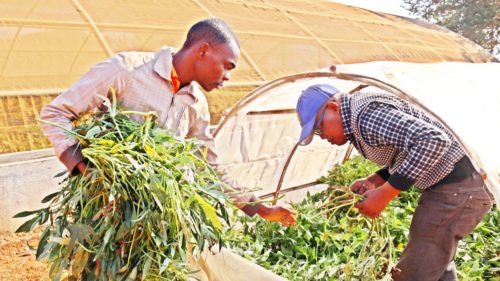Orange-fleshed sweetpotato (OFSP) is recognized by the Government of Mozambique as one of the most important crops for mitigating food insecurity and malnutrition among its 28 million people. In Niassa Province, Northern Mozambique, the government is actively promoting OFSP as part of its action plan to reduce chronic malnutrition among children below the age of five from 44% to 30% by 2019. To achieve this target, households must have good quality planting material at the onset of the rains.
In November 2012, Irish Aid funded the Nutritious Orange-Fleshed Sweetpotato for Niassa, project, which is led by International Potato enter (CIP). Through this four-year initiative, governmental and non-governmental partners quickly recognized the pivotal role that decentalised vine multipliers (DVMs) could play in multiplying and distributing vines to households, and in disseminating information about good farming practices, sweetpotato storage and utilization techniques.
The Instituto de Investigação Agrária de Mozambique (IIAM), has been working in collaboration with CIP to conserve, multiply and disseminate three OFSP varieties – Gloria, Delvia and Irene to the DVMs. The vine dissemination is structured around two levels. The first level is made up of 25 primary multipliers, who are considered among the best OFSP producers in their locality, and have shown commitment to maintain high agronomic practices over time. These DVMs receive water pumps, support to construct net tunnels measuring 3m by 1.8m, and clean planting material from IIAM, which they plant in the net tunnels. After about two to three months, they can harvest vines for the first time for further multiplication in the open field. Benjamin Rakotoarisoa, the project manager of the Nutritious Sweetpotato for Niassa, explains that DVMs harvest 40kg for the first, 30kg for the second and 25kg in the third harvest of vines from net tunnels.

The second level is made up of 46 secondary multipliers, who receive planting material from the primary multipliers’ net tunnels for further multiplication in the open field. Vine multipliers work closely with a CIP agronomist to maintain their net tunnels, and to optimize vine production through good practices, e.g. the use of farmyard manure or compost. Local agricultural authorities and NGOs collaborate with the DVMs to distribute the planting material to households.
“We have 20 hectares of land under open field multiplication. Seventy-three tons of vines were harvested from these fields and distributed to 31,548 households this year,” says Rakotoarisoa.
Most districts in Niassa planting OFSP
Arnaldo Maximiliano Maloa is the focal point for food security and nutrition, and, the head of agricultural extension services in Niassa Province. According to him, the greatest success has been the increase in OFSP production. Maloa says that within one year, a kilogram of good quality vines could generate planting material to plant up to ten hectares.
“You can get income from the vines, consume the leaves and in four months, you can consume or sell the roots,” he says.
It is this versatility that is attracting farmers be to the crop. One such farmer is Fernando Alabe, a DVM in Niassa. In 2016, he planted six hectares from which he harvested 875 bags. He sold each bag for 250 Meticais. This is in addition to the income he received from the sale of vines. With the income he generated, he has already been able to construct two houses.
The net tunnel technology, which was originally targeted to eight districts of Niassa, is enabling farmers in neighboring provinces to plant the beta-carotene rich OFSP. “We feel proud because most of the districts are planting OFSP. In the months of May and June, the provinces of Cabo Delgado and Nampula province are planning to buy vines from us. Other provinces like Zambezia are also interested,” Maloa says.
The expanding market will no doubt be an incentive for the DVMs in Niassa to continue their operations, and to keep the pipeline that allows clean, disease-free planting material from the research station to the farmers.
Read DVM Fernando Alibi’s story here on Farmer’s of Earth.
